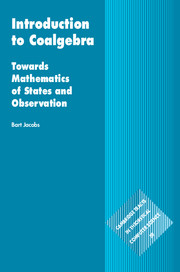Preface
Published online by Cambridge University Press: 22 December 2016
Summary
Mathematics is about the formal structures underlying counting, measuring, transforming etc. It has developed fundamental notions like number systems, groups, vector spaces (see e.g. [345]) and has studied their properties. In more recent decades also ‘dynamical’ features have become a subject of research. The emergence of computers has contributed to this development. Typically, dynamics involves a ‘state of affairs’, which can possibly be observed and modified. For instance, the contents of a tape of a Turing machine contribute to its state. Such a machine may thus have many possible states and can move from one state to another. Also, the combined contents of all memory cells of a computer can be understood as the computer's state. A user can observe part of this state via the screen (or via the printer) and modify this state by typing commands. In reaction, the computer can display certain behaviour. Describing the behaviour of such a computer system is a non-trivial matter. However, formal descriptions of such complicated systems are needed if we wish to reason formally about their behaviour. Such reasoning is required for the correctness or security of these systems. It involves a specification describing the required behaviour, together with a correctness proof demonstrating that a given implementation satisfies the specification.
Both mathematicians and computer scientists have introduced various formal structures to capture the essence of state-based dynamics, such as automata (in various forms), transition systems, Petri nets and event systems. The area of coalgebra has emerged within theoretical computer science with a unifying claim. It aims to be the mathematics of computational dynamics. It combines notions and ideas from the mathematical theory of dynamical systems and from the theory of state-based computation. The area of coalgebra is still in its infancy but promises a perspective on uniting, say, the theory of differential equations with automata and process theory and with biological and quantum computing, by providing an appropriate semantical basis with associated logic. The theory of coalgebras may be seen as one of the original contributions stemming from the area of theoretical computer science.
- Type
- Chapter
- Information
- Introduction to CoalgebraTowards Mathematics of States and Observation, pp. vii - xviPublisher: Cambridge University PressPrint publication year: 2016



